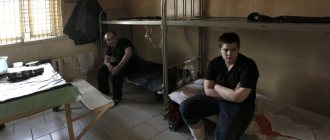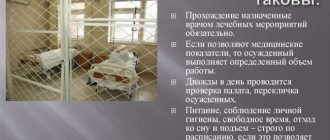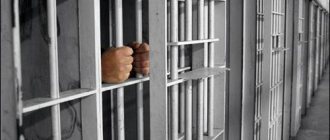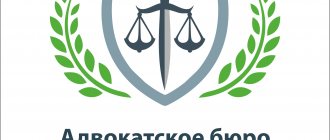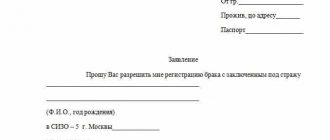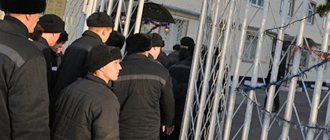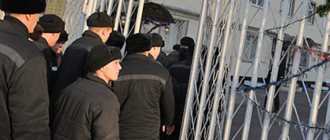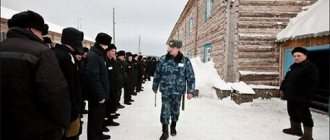The Government of the Russian Federation protects and respects the rights, freedoms and legitimate interests of convicts, ensures the legality of the use of means, their correction, legal protection and personal safety during the execution of punishments.
Convicts are guaranteed the rights and freedoms of citizens of the Russian Federation with restrictions and exceptions that are established by criminal, penal and other legislation. Convicts are not exempt from performing their civil duties, except in cases established by federal law.
The rights of convicts who are not citizens of the Russian Federation and do not have citizenship are regulated by international treaties of the Russian Federation on the legal status of foreign citizens and stateless persons. At the same time, all exemptions and restrictions provided for by criminal, penal and other legislation of the Russian Federation are observed.
The specific scope of the rights of convicts serving sentences in places of deprivation of liberty is established by the Criminal Executive Code, based on the type of sentence being served.
The Code also establishes the basic rights of prisoners:
- To receive information about your own rights and responsibilities. On the procedure and conditions for serving the sentence established by the court.
- To normal treatment by the staff of the institution where the punishment is carried out. Harsh or degrading treatment or punishment is prohibited. The principle of legality of measures taken against convicted persons is observed.
- Convicts have the right to personal security.
- To apply in the language they speak with proposals, statements and complaints to the administration, institutions or bodies that execute punishment, the court, prosecutors, state authorities and local governments, to the Commissioner for Human Rights in the Russian Federation, to public monitoring commissions , public associations, as well as in accordance with international treaties of the Russian Federation in 2022 to international bodies for the protection of human rights and freedoms.
- For health protection. This includes receiving first aid and specialized medical care in an outpatient or inpatient setting, depending on the medical report.
- To provide psychological assistance by employees of the psychological service of a correctional institution or other persons who have the right to do so.
- To receive pensions and social benefits.
- To receive legal assistance.
- To exercise this right, prisoners are granted visits with lawyers or other persons who have the right to provide legal assistance, without limiting their number and lasting up to 4 hours. Meetings with a lawyer are granted in private at the request of the prisoner. In this case, no technical means for listening are used.
- Convicted citizens of another state have the right to maintain contact with diplomatic missions and the consulate of their state in the Russian Federation.
Human rights organizations protect the rights of prisoners . Medical, scientific or other experiments related to the testing of drugs, new diagnostic methods, prevention and treatment of diseases, as well as biomedical research are prohibited.
Convicts are guaranteed freedom of religion and conscience. At the same time, religious rituals should not violate the rules of being in a correctional institution.
Filming, photography and video recording of prisoners is permitted only after obtaining their consent in writing.
General terms
The internal regulations of the pre-trial detention center (Rules - below) were approved by order of the Ministry of Justice of the Russian Federation No. 189 of October 14, 2005.
The introductory part of the Rules specifies the principles of organizing temporary detention facilities for arrested persons and suspects. They are:
- respect for the rights of suspects and their isolation from society;
- organization of an acceptable mode of existence;
- performing tasks related to the investigation of crimes and making a fair decision by the court.
Hint: implementation of the Rules is entrusted to the administration of the institution and the people contained in it.
For violation of regulations, both parties may be punished. The document describes all the processes to which the suspect is subjected. The rules are prohibited from breaking. The work of pre-trial detention center employees is subject to state supervision. This function is assigned to the prosecutor's office.
Download for viewing and printing:
Order of the Ministry of Justice of the Russian Federation No. 189 of October 14, 2005
Working conditions of convicts
The working conditions of convicts are regulated by labor legislation, primarily by the rules of labor protection, safety precautions and industrial sanitation.
In accordance with the labor legislation of the Russian Federation, convicted persons have the right to paid leave. The duration of working hours, labor protection, safety and industrial sanitation rules are established.
Convicts lose the right to benefits associated with continuous work experience . But the time of paid work is counted towards their total length of service.
If a convicted person systematically evades work three or more times during a month, this month is excluded by decision of the administration from the total work experience. The convicted person has the right to appeal this decision in court.
The right of convicted persons to annual paid leave:
- Those serving imprisonment in other correctional institutions - 12 working days.
- Those serving imprisonment in educational colonies - 18 working days.
The salary of convicts should be distinguished from the actual amount of money that is credited to their personal account. Since wages, pensions or other income are withheld to reimburse the costs of their maintenance, which include the cost of food, clothing, utilities and personal hygiene products.
Convicts can take advantage of the right to leave after six months of work in a correctional institution. In this case, the time the convicted person is kept in a punishment cell, solitary confinement, or cell-type premises is not counted towards the period of granting leave.
Vacations are granted with or without travel outside of places of deprivation of liberty. This relationship is regulated not only by the Code of Criminal Procedure of the Russian Federation, but also by the Labor Code.
Thus, people in prison belong to a special category of citizens who need legal support. Persons who have committed a crime and broken the law may also have the right to protection.
As a result of being behind bars, a person has the opportunity to rethink his behavior. Regardless of the degree of punishment, a certain set of rights, legitimate interests and legal prohibitions must be respected. They are the legal status of persons serving time.
Reception
Placement in a pre-trial detention center is carried out on the basis of a document. In particular, the escort is obliged to provide the employee with:
- court decision with seal;
- protocol on the detention (if one was carried out);
- client's passport;
- birth certificate of a minor under 3 years old who arrived with his mother;
- other documents confirming relationship.
The suspect undergoes the following procedures:
- search;
- examination by a physician;
- an interview during which his rights and obligations are explained to him;
- placed in the chamber.
Pregnant women and women with children are provided with more comfortable living conditions. Minors are placed separately in cells designed for 4-6 people. A convict with good characteristics may be placed together with persons under eighteen years of age. This requires permission from the supervising prosecutor.
Important: if during the examination the client’s body is found to have damage, the physician draws up a report. The document is sent to the head of the pre-trial detention center.
General rules for the detention of prisoners
Russian legislation establishes a number of general requirements for working with prisoners and the criteria on which this work should be based. These include:
- Ensuring the legality and validity of a person’s detention.
- Creation of decent conditions of detention.
- Medical provision for accused and convicted persons in accordance with certain standards.
- Creating conditions for labor, educational and other developmental activities of prisoners.
- Carrying out work on complaints from prisoners.
Nuances in the implementation of these rules in practice are provided, taking into account the specifics of correctional institutions:
- To support men.
- Women's IR.
- Colony for juvenile delinquents.
Special conditions must be created for pregnant women and women with children under three years of age, as well as for sick prisoners.
Cameras
Citizens who have not yet been recognized as criminals are kept in pre-trial detention centers. Acceptable living conditions are created for them in the cells. In particular, the Rules indicate such content factors as security (by the number of contents):
- sleeping place (bunk beds, single-tier beds for pregnant women and mothers with babies);
- tables and benches;
- food cabinets;
- devices and items for hygiene procedures and washing;
- mirror;
- container with drinking water;
- water heater or hot water;
- socket for connecting devices;
- radio point and receiver of a national channel;
- lighting;
- ringing alarm.
Attention: the document states that cells are allowed to be equipped with a TV, fan, refrigerator, if available.
Conditions for pregnant women and mothers are somewhat more comfortable. A crib and bath are provided for children. In addition, the room is equipped with additional furniture.
Download for viewing and printing:
Internal regulations of pre-trial detention centers of the penal system
Essentials
The regulations also regulate the list of things that prisoners in prisons and colonies can own. In 2020, a number of amendments were made to expand the list of such things. The main list includes:
- Clothing of the established standard, as well as a tracksuit for men and a robe for women prisoners.
- Food products that are stored for a long time and do not require additional preparation. They should not contain alcohol or tonics.
- Cigarettes and matches.
- Linen no more than four sets.
- Socks. Women are additionally allowed to have stockings or tights.
- Gloves or mittens.
- Handkerchiefs.
- Slippers.
- Cosmetics and personal hygiene items.
- Toiletries.
- Disposable razors or electric razors and a small mirror.
- Medicines with doctor's permission. Typically, permission is issued for crutches, prostheses and other devices without which the prisoner cannot move. Medicines are prescribed by the correctional officer and only this list can be kept by the prisoner.
- Boiler.
- Pens, pencils and notebooks.
- Religious objects associated with the religion of the convicted.
- Books, newspapers and magazines.
Searches and inspections are regularly carried out in penal colonies and prisons to search for prohibited items. Particular attention is paid to searching for alcohol, drugs and things that can be used as weapons. It is also prohibited to store cash in the IC. Money is allowed in the prisoner's account, with which he can make purchases in the prison store.
Have a question for a lawyer? Ask now, call and get a free consultation from leading lawyers in your city. We will answer your questions quickly and try to help with your specific case.
Telephone in Moscow and the Moscow region: +7
Phone in St. Petersburg and Leningrad region: +7
Free hotline throughout Russia: 8 (800) 301-39-20
Rules and routine
The life of suspects is subject to a strict routine.
Rise in the cells occurs at 6 am. This is followed by hygiene procedures. Then breakfast. During the day, the inmates are taken out for walks. In addition, they are allowed to spend their free time playing board games (provided by the institution). The administration of the pre-trial detention center is obliged to facilitate investigative measures. Therefore, she is entrusted with organizing meetings of suspects:
- with law enforcement officers and prosecutors;
- with lawyers.
Employees of the authority monitor compliance with the regime. They can conduct cell inspections at any time. In addition, the head of the pre-trial detention center receives complaints from “guests.” He is responsible for everything that happens in his jurisdiction.
People awaiting a court decision are allowed to receive parcels from loved ones. Their contents are carefully checked to identify inappropriate items. The latter are confiscated. At least once every seven days a week, people are given the opportunity to take a shower.
Lights out at the pre-trial detention center at 10 p.m. It is announced by turning off the daylight in the cells. Before bedtime, people have the opportunity to study periodicals and books:
- provided by your local library;
- self-prescribed.
For information: for writing complaints and letters, the administration provides prisoners with paper and pen (on request).
Features of the internal regulations of pre-trial detention centers and other correctional institutions
Different types of correctional institutions have their own nuances of routine and restrictions set for prisoners. In a pre-trial detention center, conditions are harsher in a number of respects than in a correctional facility. Only in 2015, the list of things allowed for use in Russian pre-trial detention centers was changed. The prisoners under investigation were allowed to possess a number of items that had been prohibited until that time. The changes affected hygiene products, clothing, and food. Since 2015, it has become possible to receive these items in parcels and transfers from relatives.
Also, these items appeared in the stores of the pre-trial detention center, which made it possible for prisoners to buy them with the permission of the administration.
In addition to this, changes have also occurred in the procedure for checking parcels and deliveries. Some verification options were limited. The emphasis was on inspection using technical means, and cutting the packaging or the products themselves was only allowed if the main inspection revealed foreign objects inside the products.
The basis for the formation of internal rules of specific correctional institutions is the order of the Ministry of Internal Affairs No. 205. It specifies the rights of prisoners and the basic requirements for conditions of detention in a pre-trial detention center.
The order also establishes restrictions on contacts between prisoners and the boundaries of their relationships with employees of the pre-trial detention center administration.
Regular checks of prisoners' cells and personal belongings are determined by the internal regulations of correctional institutions. In addition, they must conduct an additional check once a month. This rule is contained in the above order.
Nutrition
The institution provides food for the suspects using government money.
Thus, in paragraph 44 of the Rules it is written: “44. Suspects and accused persons are provided with three free hot meals daily according to the standards determined by the Government of the Russian Federation.”
This last statement regarding standards may come as a surprise to most defendants. They will be given small portions. The diet is prepared according to medical rules so that a person does not suffer from a lack of nutrients. For most people, this factor is annoying due to previously acquired food preferences and habits.
For information: paragraph 50 of the Rules contains a provision that the administration has the right to provide paid household and health services to clients (organize the operation of a food stall).
Transfers
Those held in the pre-trial detention center are helped by their relatives. The latter are allowed to take part in the material support of suspects:
- send parcels weighing up to 30 kg per month;
- pay for products sold at a local stall, generally of the same weight.
Hint: Restrictions do not apply to transfers to certain individuals. These include:
- pregnant women;
- mothers with children under 3 years old;
- minors.
All shipments are opened and checked. This is done in the presence of a loved one, if the latter brought the parcel personally. If the parcel arrived by mail, it is checked by a commission consisting of at least three employees. All items and products included in the list of prohibited items are confiscated. They can be picked up by the person who brought the package.
For information: a loved one of the accused is required to fill out an application in triplicate and attach it to the parcel. In addition, his passport is taken while the contents are being checked. Upon completion, the document is returned along with one copy of the application, which contains a mark indicating acceptance of the transfer.
Recruiting suspects
While in detention, a person should have the opportunity to earn money. Organizing the conditions for this falls on the shoulders of the administration. Suspects need to do the following:
- write a statement of desire for temporary employment to the head of the institution;
- wait for a response within three days;
- begin performing assigned duties.
You will have to work in a cell or on the territory of the institution. Prisoners are assigned duties without high qualifications (laborer, janitor, for example). Those who successfully cope with the work may be allowed to serve their sentences within the pre-trial detention center.
All working suspects are paid a salary. Taxes and fees (alimony, if there is an administrative document) are withheld from the payment. The money is transferred to the person’s personal account.
Walk
In order to maintain the health of people kept indoors, they are organized for walks in the fresh air. For this purpose, courtyards are organized on the territory of the institution. They will be equipped with:
- benches;
- canopies from precipitation;
- sandboxes and greenery (for women in a privileged position);
- places for active sports (for minors).
The duration of exposure to air varies for certain groups. In this case, only the “residents” of one cell are taken out into the courtyard at a time. In order to prevent unauthorized communication, a staggered walking schedule is created. The duration of the latter is:
- one hour in general mode;
- two - for minors;
- unlimited - for pregnant women and mothers with babies.
Hint: if the accused missed time for a walk due to participation in investigative activities, then he should write a statement to his superiors. Additional time will be provided at other times.
Can I use the phone
Mobile phones are prohibited in cells. The suspect can only talk through the official line, which is under the control of the administration. Such external contact requires written permission from the body in charge of the case (court, police). The conversation takes place under the control of a pre-trial detention center officer. Moreover, the latter has the right to stop negotiations at any time. The reasons are:
- transmission of inappropriate information that is harmful to the investigation;
- use of a foreign language not originally declared.
Attention: payment for the use of communication comes from the funds of the accused.
Medical service
Upon admission to the isolation ward, a medical examination of each person is carried out. Moreover, a suspect can enter a general cell only after receiving permission from doctors. The suspect is kept in a separate room until the medical examination. In addition, the institution has a medical unit. It has the following capabilities:
- for outpatient treatment;
- for conducting surveys and analyses;
- for inpatient care for sick people.
Sick patients are isolated from others so as not to harm the health of other people. Based on the suspect's complaint, examination and treatment are carried out. People suffering from dangerous diseases are kept in a separate cell.
At the request of a lawyer, the accused may be sent for examination to an inpatient clinic. In addition, the results of examinations by local doctors must be provided to the investigation or to relatives upon written request.
Diagnoses that do not allow keeping people in pre-trial detention centers
During the initial medical examination, signs of diseases that affect the person’s detention regime are identified. Some provide grounds for exemption from detention. However, such a diagnosis must be confirmed by a medical commission. For this purpose, a separate court decision is made to send the person for a medical examination to a hospital organization.
The following diagnosis may be the basis for release from stay in a pre-trial detention center:
- dangerous infection, including parasite infection;
- open forms of tuberculosis with complications;
- malignant tumors in a severe stage;
- endocrine system defects;
- severe forms: diabetes;
- lesions of the thyroid gland;
- atrophy;
- lesions of the digestive system requiring a special diet;
Hint: the decision to release a suspect from detention away from society can only be made by the court on the basis of a medical report.
XXIV. INTERNAL RULES OF CORRECTIONAL INSTITUTIONS
XXIV. Features of the conditions of detention of convicts in punishment cells, PKT, EPKT, solitary confinement
152. Convicts are prohibited from taking with them into the punishment cell their food and personal belongings, with the exception of two towels of the established sample, an aluminum mug, soap, toothbrush, toothpaste (tooth powder), toilet paper, personal hygiene products, slippers, writing and postal supplies, as well as religious literature (no more than 1 copy), religious objects for personal use for body or pocket wear. Personal hygiene products, disposable razors and utensils for eating (with the exception of mugs) are stored in a specially designated place and are issued to convicts by the junior inspector for the supervision of convicts in the punishment cell only for a time specified in the daily routine.
153. Convicts placed in a punishment cell are allowed to use printed publications from the library of the correctional institution in their personal time in accordance with the daily routine of the punishment cell.
154. Writing and postal materials available to convicts are kept by the junior inspector for the supervision of convicts in the punishment cell and are issued to them while writing letters, postcards and telegrams.
155. Food products are deposited in a warehouse and issued to convicts after they have served their sentence. The administration of the correctional institution takes measures to ensure their safety, but if, due to natural reasons, the products have deteriorated due to long-term storage, a report is drawn up about this and they are destroyed.
156. Smoking is prohibited for convicts placed in a punishment cell. Convicts transferred to PKT, EPKT, solitary confinement are allowed to smoke during the period of walking, provided for by the daily routine of the correctional facility. Cigarettes and matches are provided to convicts at their request by a junior inspector for the supervision of convicts held in penal premises.
157. Convicts transferred to PKT, EPKT or solitary confinement as punishment are not allowed to take with them their personal belongings, except for food, two towels of the established sample, an aluminum mug, seasonal underwear and socks of the established sample, soap, tooth powder, paste, toothbrush, toilet paper, personal hygiene items, slippers, as well as religious literature (no more than 1 copy), religious items for personal use for body or pocket wear. Personal hygiene products, disposable razors, utensils for eating (with the exception of mugs) and cigarettes are stored in a specially designated place and are issued to convicts by the junior inspector for the supervision of prisoners in PKT, EPKT, solitary confinement only for a time determined by the daily routine.
158. Convicts transferred to PKT, EPKT and solitary confinement are allowed to subscribe to books, magazines and newspapers, to have with them court decisions on a criminal case, as well as answers based on the results of consideration of proposals, applications, petitions and complaints, simple pencils, fountain pens (in non-metallic case), rods (blue, purple, black), notebooks, postage stamps, postcards, envelopes, use printed publications from the library of the correctional institution in accordance with the daily routine of PKT, EPKT, solitary confinement cells, while the number of the listed items in use is not There may be more than two copies, excluding postage stamps, postcards and envelopes.
159. When convicts are admitted to punishment cells, PKT, EPKT, solitary confinement, the convicts are searched, sanitized, which also includes washing, after which the convicts change into clothes assigned to these premises.
160. Convicts studying in secondary schools, vocational educational organizations and directly in the workplace during production activities, while in punishment cells, PKT, EPKT and in solitary confinement are not taken to classes. They are allowed to carry textbooks and are given the opportunity to study independently and consult with teachers. When transferring convicts from the PKT, EPKT or from solitary confinement to a punishment cell for offenses committed in the PKT, EPKT and in solitary cells, the period of their detention in the punishment cell is not counted towards the period of detention in the PKT, EPKT and in solitary cells. In the case of transfer of a convicted person to the PKT, EPKT for malicious violation of the established procedure for serving a sentence from a punishment cell, the period of detention in the PKT, EPKT is calculated after serving the penalty in the punishment cell. When transferring convicts from the FCT to the EPCT for offenses committed in the FCT, the period of their stay in the EPCT is not counted towards the period of detention in the FCT.
161. Convicts eat food in their cells. Convicts for whom a penalty in the form of placement in a punishment cell is imposed with a transfer to work receive food during working hours at production facilities.
162. Medical examination and outpatient treatment of convicts held in punishment cells, PKT, EPKT and in solitary confinement are carried out in a specially equipped room. Sanitation is carried out separately from other convicts. Convicts receiving treatment on an outpatient basis are placed in separate cells for medical reasons.
163. Bedding for convicts placed in a punishment cell, transferred to PKT, EPKT, solitary confinement, is provided only for the period of sleep. When taken outside the premises, they are given clothing for the season.
164. Convicts held in punishment cells, PKT, EPKT and in solitary confinement keep their hands behind their backs when moving outside their cells. Each time convicts are taken out of their cell, they are personally searched, and the person being searched stands facing the wall, resting his arms against the wall, with his feet shoulder-width apart.
165. Cleaning in the cells of the punishment cell, PKT, EPKT and exercise yards is assigned in turn to each convict according to a schedule approved by the deputy head of the correctional institution, who oversees security and operational work, and communicated to the convict against signature. If the convicted person refuses to familiarize himself with the schedule, a corresponding act is drawn up.
166. The convict responsible for cleaning receives and hands over equipment for cleaning the cell, monitors the cleanliness of the cell; cleans the cell bathroom, and at the end of the walk, the exercise yard.
Washing of prisoners in punishment cells, PKT, EPKT, and solitary cells is carried out cell by cell in the shower equipped in the indicated premises.
167. When visiting convicts in the cells of a punishment cell, PKT, EPKT, solitary confinement, the administration of the correctional institution, as well as persons exercising control over the activities of the correctional institution and penal system bodies, at their request, the convicts are obliged to introduce themselves one by one, give their last name, first name and patronymic ( if available), date of birth, articles of the Criminal Code of the Russian Federation under which they were convicted, the beginning and end of the term, while the convicted must stand and line up against the wall opposite the entrance to the cell.
168. Convicts held in punishment cells, PKT, EPKT, solitary confinement are prohibited from:
without the permission of the administration of the penitentiary institution, to leave the cells and other premises of the punishment cell, PKT, EPKT, solitary confinement;
negotiate, transfer any objects to persons held in other cells or other premises of the punishment cell, PKT, EPKT, solitary confinement cells, knock or correspond with them;
use camera equipment and cleaning equipment for other purposes;
interfere with the operation of electrical and plumbing equipment, repair plumbing or adjust the lighting in the cell without permission from the administration of the penal institution;
littering the bathrooms in the cells;
remove from the walls of cells information about the basic rights and responsibilities of prisoners in correctional institutions, the peculiarities of their detention in punishment cells, PKT, EPKT, solitary confinement;
cause false alarms;
throw or take anything from the cell windows, lean out of the window, come close to the inspection peephole of the cell door, close the inspection peephole;
cover the lenses of CCTV cameras or otherwise render them inoperative;
open the window for eating in the chamber door.
169. In cases of transfer of convicts from punishment cells, PKT, EPKT, solitary confinement to health care facilities for reasons not related to feigning illness, the period of their stay in the health care facility is counted towards the period of serving penalties. When a convicted person commits an act of self-harm, he is transferred from a punishment cell, PKT, EPKT, or solitary confinement to a medical facility based on a medical report.
170. When transferring convicts from a pre-trial detention center, PKT, EPKT, solitary confinement cells to a pre-trial detention center, the period of their stay in the pre-trial detention center is not counted towards the period of serving penalties.
171. At their request, clergy belonging to duly registered religious associations, at the choice of the convicts, are invited to visit convicts held in punishment cells, PKT, EPKT, and solitary confinement.
Note: in emergency cases, in the absence of the head of the correctional institution, when it is impossible to stop the crime being committed or a malicious violation of the established procedure for serving the sentence by other measures, convicts can be placed in a punishment cell, in special regime correctional colonies - in solitary confinement by order of the assistant on duty to the director of the correctional institution before the arrival of the director PS or a person replacing him, but not more than 24 hours. Such isolation is not a disciplinary sanction. If the head of the correctional institution chooses a penalty in the form of placement in a punishment cell, the time spent in this room by decision of the assistant on duty to the head of the correctional institution or the person replacing him is counted towards the total period of detention in the punishment cell.
Features of keeping minors
Persons under 18 years of age are in a privileged position. The administration is obliged to create more comfortable conditions for them. Thus, they are kept separately from adults, in cells with no more than six people. In addition, they are entitled to:
- longer walk;
- physical exercise to maintain health and development;
- a higher calorie diet (food is prepared separately);
- conducting school classes in separate rooms.
A full-time psychologist works with juvenile defendants.
